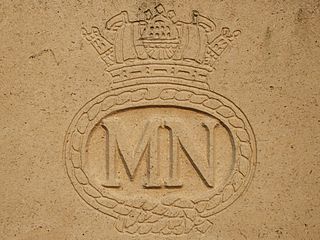Related Research Articles
Independent agencies of the United States federal government are agencies that exist outside the federal executive departments and the Executive Office of the President. In a narrower sense, the term refers only to those independent agencies that, while considered part of the executive branch, have regulatory or rulemaking authority and are insulated from presidential control, usually because the president's power to dismiss the agency head or a member is limited.

The Merchant Navy is the maritime register of the United Kingdom and comprises the seagoing commercial interests of UK-registered ships and their crews. Merchant Navy vessels fly the Red Ensign and are regulated by the Maritime and Coastguard Agency (MCA). King George V bestowed the title of "Merchant Navy" on the British merchant shipping fleets following their service in the First World War; a number of other nations have since adopted the title. Previously it had been known as the Mercantile Marine or Merchant Service, although the term "Merchant Navy" was already informally used from the 19th century.
An executive officer is a person who is principally responsible for leading all or part of an organization, although the exact nature of the role varies depending on the organization. In many militaries and police forces, an executive officer, or "XO", is the second-in-command, reporting to the commanding officer. The XO is typically responsible for the management of day-to-day activities, freeing the commander to concentrate on strategy and planning the unit's next move.

The Association of Scientific, Technical and Managerial Staffs (ASTMS) was a British trade union which existed between 1969 and 1988.
Insurance law is the practice of law surrounding insurance, including insurance policies and claims. It can be broadly broken into three categories - regulation of the business of insurance; regulation of the content of insurance policies, especially with regard to consumer policies; and regulation of claim handling wise.
The maritime history of the United States is a broad theme within the history of the United States. As an academic subject, it crosses the boundaries of standard disciplines, focusing on understanding the United States' relationship with the oceans, seas, and major waterways of the globe. The focus is on merchant shipping, and the financing and manning of the ships. A merchant marine owned at home is not essential to an extensive foreign commerce. In fact, it may be cheaper to hire other nations to handle the carrying trade than to participate in it directly. On the other hand, there are certain advantages, particularly during time of war, which may warrant an aggressive government encouragement to the maintenance of a merchant marine.

A merchant navy or merchant marine is the fleet of merchant vessels that are registered in a specific country. On merchant vessels, seafarers of various ranks and sometimes members of maritime trade unions are required by the International Convention on Standards of Training, Certification and Watchkeeping for Seafarers (STCW) to carry Merchant Mariner's Documents.
The National Union of Marine, Aviation and Shipping Transport Officers (NUMAST) was a trade union representing seafarers and allied workers, based in the United Kingdom.

An officer is a person who holds a position of authority as a member of an armed force or uniformed service.
The General Council of the Trades Union Congress is an elected body which is responsible for carrying out the policies agreed at the annual British Trade Union Congresses (TUC).
The National Union of Insurance Workers (NUIW) was a trade union representing workers in the insurance industry in the United Kingdom.
The Ashton-under-Lyne and District Power Loom Weavers' Association was a trade union representing cotton weavers in the Ashton-under-Lyne area of Lancashire, in England.
The Civil Service Alliance was a trade union federation bringing together civil servants in the United Kingdom.
The Radio and Electronic Officers' Union (REOU) was a trade union representing radio operators on British civilian ships.
The International Mercantile Marine Officers' Association (IMMOA) was a global union federation bringing together trade unions representing officers in merchant navies.
Charles Douglas Smith Tennant was a British trade union leader.
The Federation of Maritime Workers was a trade union representing sailors in the Netherlands.
The Norwegian Maritime Officers' Union is a trade union representing navigators and those in similar roles in Norway.
William Harry Coombs was a British sailor, insurance company founder, barrister and trade union leader.
Eric Nevin was a British trade union leader.
References
- ↑ Eaton, Jack; Gill, Colin (1981). The Trade Union Directory. London: Pluto Press. pp. 47–48. ISBN 0861043502.
- 1 2 Arthur Marsh and Victoria Ryan, Historical Directory of Trade Unions, vol.3, pp.203-204